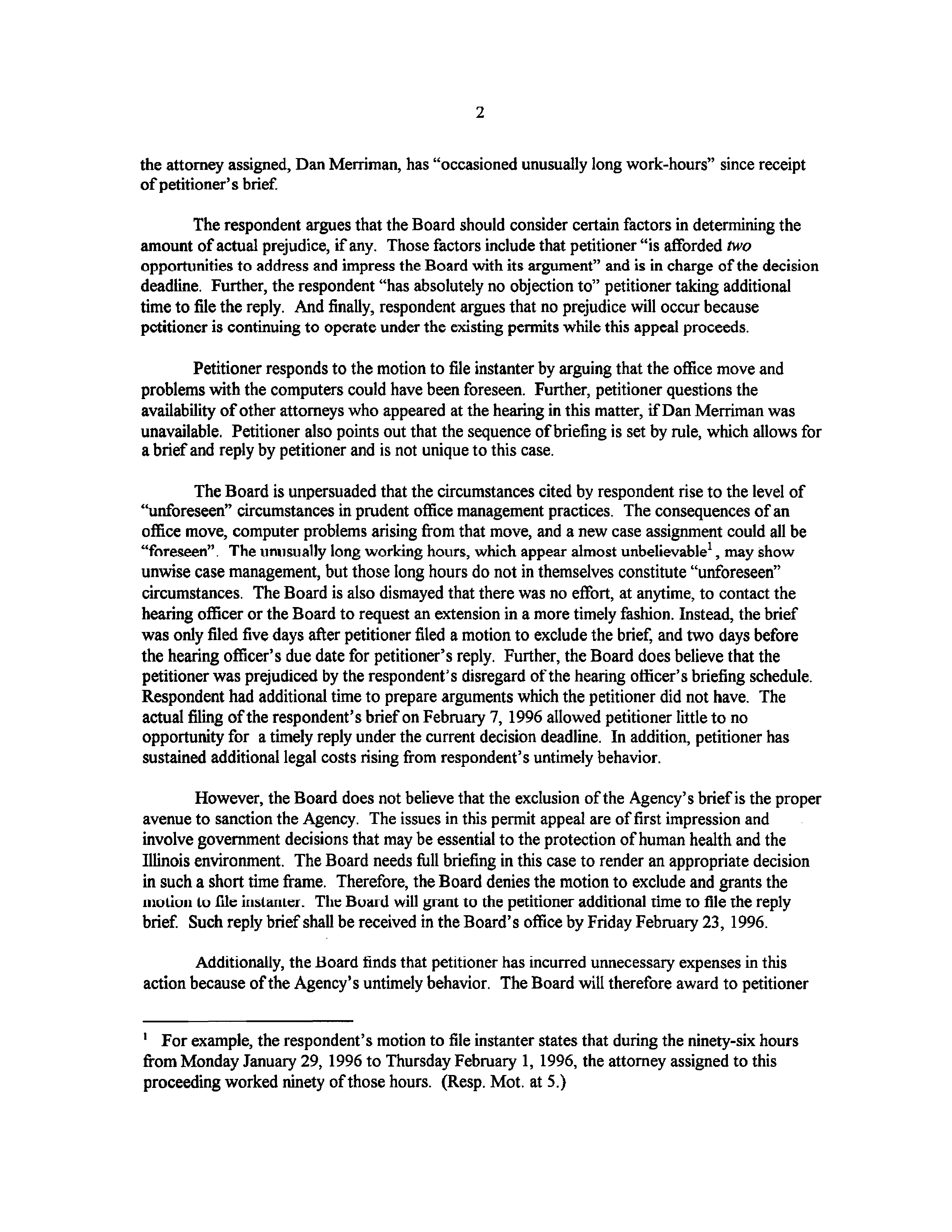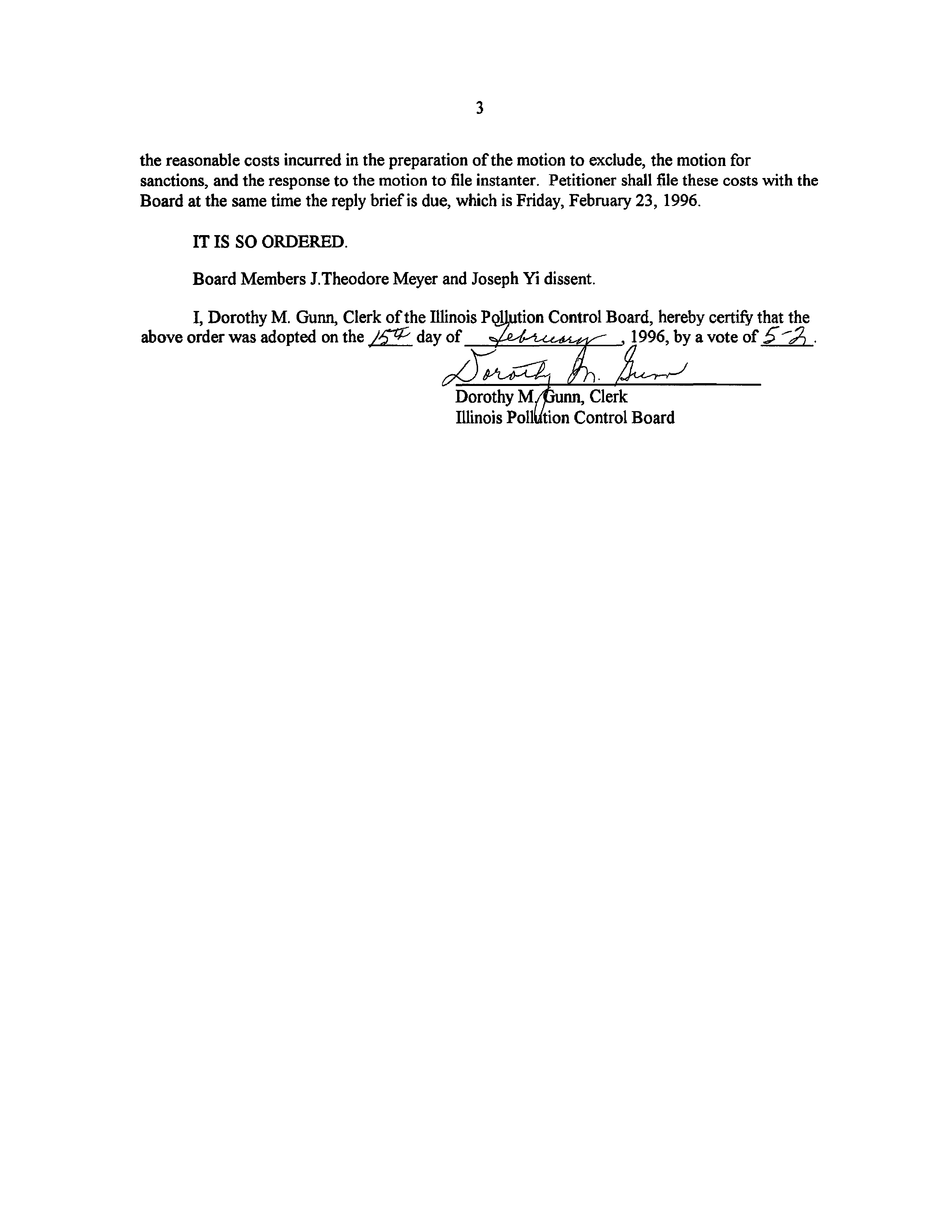ILLINOIS POLLUTION CONTROL BOARD
February
15,
1996
ESG WATTS, INC.,
an Iowa corporation,
)
PCB
94-243
)
94-306
Petitioner,
)
94-307
)
94-308
v.
)
94-309
)
95-133
ILLINOIS ENVIRONMENTAL
)
95-134
PROTECTIONAGENCY,
)
(Permit Appeals
-
Land)
)
(Consolidated)
Respondent.
)
ORDER OF
THE
BOARD
(by
CIT. Girard):
On February 2,
1996, the petitioner filed a motion to exclude respondent’s brief
On
February 7,
1996, the Board received a response to that motion and a motion to file the post..
hearingbriefofrespondent instanter.
Petitioner directedits motion
to the hearing officerin this
proceeding.
OnFebruary
13,
1996, the Board received a response to the motion to file instanter
and a motion for additional sanctions.
Even though the motions at issue were originally addressed
to the hearing officer, the Board will today rule on these motions.
Petitioner argues that the briefoftherespondent should be excluded because the briefwas
not timely filed.
The petitioner states that the hearing officer’s order setting the briefing schedule
directed that thepetitioner’s briefbe at the Board’s office
on
January
12,
1996; therespondent’s
briefbe at the Board’s office on January 26; and any reply be at the Board’s office on February 9,
1996.
Both parties agreed to the briefing schedule.
Petitioner argues that to
allow the late filing
ofthebriefprejudices petitioner in at least two
ways.
First, petitioner proceeded diligently,
despite work load constraints, to submitits briefconsistent with the hearing officer’s briefing
schedule.
Second, petitioner’s asserts that the time for its reply has been shortened significantly
by the late filing ofrespondent’s brief.
In its motion foradditional sanctions, petitioner maintains that that it is appropriate to
require respondent to pay petitioner’s reasonable attorney’s fees in filing its motion to seal and the
motion for additional sanctions.
Petitionermaintains that if respondent had not “attempted to file
a copy ofits untimelybriefwith theBoard”, petitioner would not have had to prepare the
additional motions.
The rcspondcnt agrees that thc briefwas not
filed
on the due date and asks for leave
Lu
file
the briefinstanter.
Respondent maintains that due to “unforeseen circumstances” respondent was
unable to comply with thehearing officer’s briefing schedule.
The circumstances which
respondent is referring to included an office move for the attorney assigned to this case; computer
problems resulting from the move;
and a new case assignment.
Further,
respondent asserts that
2
the attorney assigned, Dan Merriman, has “occasioned unusually long work-hours”
since receipt
ofpetitioner’s brief.
The respondent argues that the Board should consider certain factors in determining the
amount ofactual prejudice, if any.
Those factors include that petitioner“is afforded
two
opportunities to address and impress theBoard with its argument” and is
in
charge ofthe decision
deadline.
Further, the respondent “has absolutely no objection to” petitioner taking
additional
time to file the reply.
And
finally, respondent argues that no prejudice will occur because
petitioneris continuing to operate under the existing permits while this appeal proceeds.
Petitioner responds to the motion to file instanter by arguing that the office move and
problems with the computers could have been foreseen.
Further, petitioner questions the
availability ofother attorneys who appeared at thehearing in this matter, ifDan Merriman was
unavailable.
Petitioner also points out that the sequence ofbriefing is set by rule, which allows for
a briefand reply by petitioner and is not unique to this case.
The Board is unpersuaded that the circumstancescited by respondent rise to the level of
“unforeseen” circumstances in prudent office management practices.
The consequences ofan
office move, computer problems arising from that move, and a new case
assignment could all be
“foreseen”.
The unusually long working hours, which appear almost unbelievable1, may show
unwise case management, but those long hours do not in themselves constitute “unforeseen”
circumstances.
The Board is also dismayed that there was no effort, at anytime, to contactthe
hearing officer or theBoard to request an extensionin a more timely fashion. Instead, the brief
was only filed five days after petitioner filed a motion to
exclude the brief, and two
days before
the hearing officer’s due date for petitioner’s reply.
Further, the Board does believe that the
petitionerwas prejudiced by the respondent’s disregard ofthehearing officer’s briefing schedule.
Respondent had additional time to prepare arguments which the petitioner did not have.
The
actual
filing
ofthe respondent’s brief on February 7,
1996 allowed petitioner little to no
opportunity for
a timely reply under the current decision deadline.
In addition, petitioner has
sustained additional legal costs rising from respondent’s untimely behavior.
However, theBoard does not believe that the exclusion ofthe Agency’s brief is the proper
avenue to sanction the Agency.
The issues in this permit appeal are offirst impression and
involve government decisions that may be essential to the protection ofhuman health and the
Illinois environment.
The Board needs frill briefing in this case to render an appropriate decision
in such a short time frame.
Therefore, theBoard denies the motion to exclude and &ants the
motion
to
file
instanLer.
The Board will giant to the petitioner additional time to file thereply
brief.
Such reply brief shall be received in theBoard’s officeby Friday February 23,
1996.
Additionally, the Board finds that petitioner has incurred unnecessary expenses in this
action because oftheAgency’s untimely behavior.
The Board will therefore award to petitioner
For example, therespondent’s motion to file instanter states that
during theninety-six hours
from Monday January 29,
1996 to Thursday February
1,
1996, the attorney assigned to this
proceeding worked ninety ofthose hours.
(Resp. Mot. at
5.)
3
the reasonable costs incurredin the preparation ofthe motion to exclude, the motion for
sanctions, and the response to the motion to file instanter.
Petitioner shall file these costs with the
Board at the same time thereply briefis due, which is Friday, February 23,
1996.
IT IS
SO ORDERED.
Board Members J.Theodore Meyer and Joseph Vi dissent.
I, Dorothy M. Gunn, Clerk oftheIllinois?
I
tion Control Board, hereby certif\r that the
above order was adopted on the
J3”Z~
day of
,
1996, by a vote of
~
Dorothy M4iunn,
Clerk
Illinois
Polliftion Control Board



